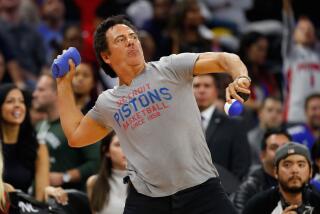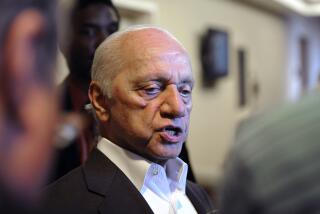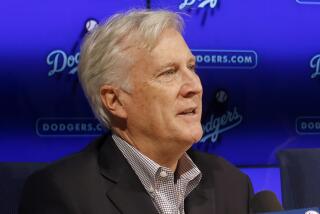Marlins Put in Previously Viewed Bin
In the summer that Peter O’Malley is bowing out as Dodger owner, Philadelphia Phillie President Bill Giles, with a long family attachment to baseball but emotionally savaged by the labor dispute and other internal problems, is turning over the club’s reins, and H. Wayne Huizenga, who should have known better, has put the Florida Marlins up for sale.
Huizenga, looking to stimulate attendance in South Florida, spent $89 million on free agents last winter, then guaranteed an additional $60 million to Gary Sheffield and Robb Nen. He talked in spring training that he would lose $15 million even if all 81 games were sold out, but now says that attendance projections indicate a loss of $30 million.
So let’s see:
He makes this huge winter investment knowing he’ll take a financial drubbing even if the stadium is filled nightly, then capitulates in response to increased losses when a 30% attendance gain isn’t enough.
How was Huizenga, who had already spent about $125 million to start up in 1993, so successful in the waste management and video rental business? How does he expect to get market value for the Marlins with all those inflated, long-term contracts on the roster?
Giles, whose father, Warren, owned the Cincinnati Reds and became president of the National League, elevated Dave Montgomery to the Phillies’ presidency and said he would concentrate on getting a new stadium built.
If that’s not in the works by December 1999, he said he will retire and that he expected his ownership group would sell.
Giles took the blame for a franchise that has floundered since its ’93 pennant.
“I had too many hurts. I was no longer as effective as I used to be,” he said, adding that the hurts accumulated since the strike in ’94.
“It’s been like Chinese water torture since then. I never believed there should be a strike. I never believed we should take away the most precious thing in the world, the World Series.
“Replacement players. Agents who don’t tell the truth. Injuries to key people. Losses. Not making people happy. Major league owners suing other owners. An industry that has created an economic system that is so difficult right now. All those things kept gripping on my mind.”
At 62, he will remain chairman, the team’s No. 1 fan, he said, but that fact seems to have been ignored in the response to his decision.
“I might be the only man who’s been able to read his own obituary,” he said, laughing.
*
His experience as an NFL defensive back didn’t prepare Brian Jordan for the pain he has experienced from a back problem that continues to resist specific diagnosis. Jordan, who became the heart and soul of the St. Louis Cardinals during their division title run last year, sat out six weeks before playing nine games and then going back on the disabled list Friday. He will see another back specialist this week.
“A lot of things are going through my head right now,” he said. “You hear so many different suggestions and opinions. Shut it down, get healthy, look for the future. Think about your career. If we were seven or eight games up, it would be easy to sit out, shut it down and wait till the [postseason], when it counts.
“That’s tough to do [with the team struggling]. There’s so many things running through my mind right now. . . . I’m going to have to make a decision very soon.”
More to Read
Go beyond the scoreboard
Get the latest on L.A.'s teams in the daily Sports Report newsletter.
You may occasionally receive promotional content from the Los Angeles Times.










